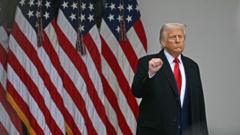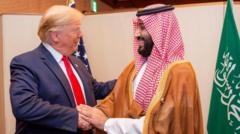As President Trump announced sweeping tariffs on imports, the implications for his administration's agenda are becoming starkly apparent as both economic and political realities come into play.
Trump's Tariff Plan Faces Backlash Amid Economic Reality

Trump's Tariff Plan Faces Backlash Amid Economic Reality
Trump's new tariffs spark turmoil in the stock market and political discontent.
Donald Trump declared April 2, 2023, as America's "liberation day" with the announcement of new tariffs on US imports. However, the stock market immediately reacted negatively, suggesting the potential repercussions of this decision could lead the week to be remembered for a clash between Trump's ambitious plans and the stark reality of economic conditions.
As turmoil ensued in the financial markets, major trade partners such as Canada, China, and the European Union indicated they would not back down, leading to fears of escalating trade disputes. Adding to the White House's tension, preparations were underway for planned anti-Trump demonstrations, prompting a postponement of scheduled public events, and limiting press interactions with officials.
Despite the market upheaval, Trump expressed confidence in the long-term benefits of his economic strategies, rooted in fostering a robust American manufacturing sector through protective tariffs against foreign competition.
However, the complexity of his foreign policy agenda, including efforts to end conflicts in Gaza and Ukraine, is becoming apparent. Recent military actions in Gaza and stalled talks with Russia highlight a growing distance from his goals, raising doubts about quick resolutions. The ongoing strife is reflected in Jake Sullivan’s commentary regarding concessions to Russia, contrasting sharply with Trump's optimistic view.
Legal challenges are also impacting Trump's immigration agenda, with court rulings affecting operations related to deportations and asylum policies. These legal hurdles come as significant elections take place, with Democrats gaining ground in battleground states, potentially changing the tide in upcoming elections.
In the wake of electoral developments, signs of dissent within the Republican party regarding Trump's tariffs have surfaced. Some members voiced concerns over potential job losses due to retaliation from foreign nations, illustrating a fracture that, if it deepens, could stem from prolonged economic challenges and declining support in opinion polls.
While Trump publicly embraces his tariff strategy, political pressures may mount if economic realities persist, leading to significant implications for his presidency as he faces increasing scrutiny from both constituents and members of his party.






















